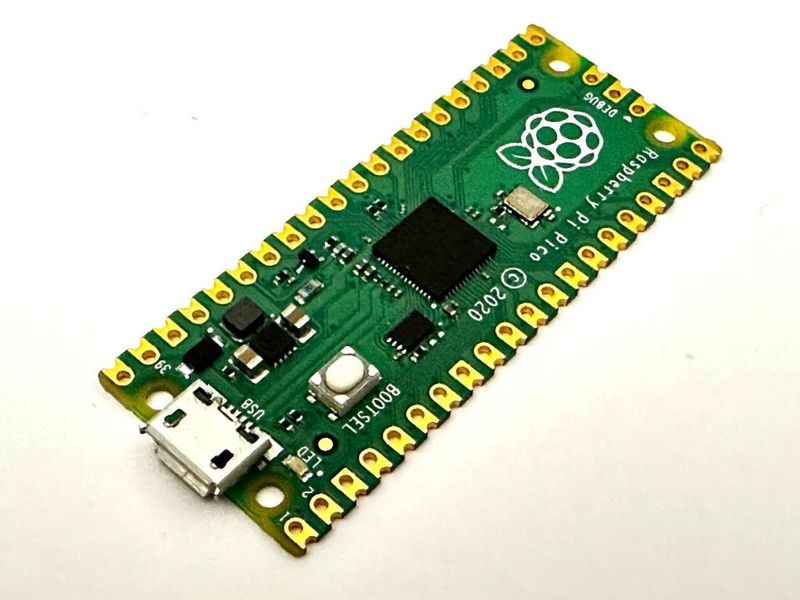Raspberry Pi Pico
RP2040 board from Raspberry Pi.

Features
- custom LED (use setStatusLight to control)
caution
I2C pins are not configured.
Stores
- https://www.raspberrypi.com/documentation/microcontrollers/raspberry-pi-pico.html
- https://www.raspberrypi.com/products/raspberry-pi-pico/
Pins
| pin name | hardware id | features |
|---|---|---|
| GP0 | GPIO0 | io |
| GP1 | GPIO1 | io |
| GP10 | GPIO10 | io |
| GP11 | GPIO11 | io |
| GP12 | GPIO12 | io |
| GP13 | GPIO13 | io |
| GP14 | GPIO14 | io |
| GP15 | GPIO15 | io |
| GP16 | GPIO16 | io |
| GP17 | GPIO17 | io |
| GP18 | GPIO18 | io |
| GP19 | GPIO19 | io |
| GP2 | GPIO2 | io |
| GP20 | GPIO20 | io |
| GP21 | GPIO21 | io |
| GP22 | GPIO22 | io |
| GP26 | GPIO26 | analogIn, io |
| GP27 | GPIO27 | analogIn, io |
| GP28 | GPIO28 | analogIn, io |
| GP3 | GPIO3 | io |
| GP4 | GPIO4 | io |
| GP5 | GPIO5 | io |
| GP6 | GPIO6 | io |
| GP7 | GPIO7 | io |
| GP8 | GPIO8 | io |
| GP9 | GPIO9 | io |
| led.pin | GPIO25 | led.pin, io |
DeviceScript import
You must add this import statement to load the pinout configuration for this device.
In Visual Studio Code, click the wand icon on the file menu and select "Raspberry Pi Pico".
import { pins, board } from "@dsboard/pico"
Firmware update
In Visual Studio Code, select DeviceScript: Flash Firmware... from the command palette.
Run this command line command and follow the instructions.
devicescript flash --board pico
Configuration
pico.json
{
"$schema": "https://raw.githubusercontent.com/microsoft/devicescript-pico/main/boards/rp2040deviceconfig.schema.json",
"id": "pico",
"devName": "Raspberry Pi Pico",
"productId": "0x3f6e1f0c",
"$description": "RP2040 board from Raspberry Pi.",
"archId": "rp2040",
"url": "https://www.raspberrypi.com/documentation/microcontrollers/raspberry-pi-pico.html",
"led": {
"#": "type=100 - special handling for Pico LED",
"pin": 25,
"type": 100
},
"pins": {
"GP0": 0,
"GP1": 1,
"GP10": 10,
"GP11": 11,
"GP12": 12,
"GP13": 13,
"GP14": 14,
"GP15": 15,
"GP16": 16,
"GP17": 17,
"GP18": 18,
"GP19": 19,
"GP2": 2,
"GP20": 20,
"GP21": 21,
"GP22": 22,
"GP26": 26,
"GP27": 27,
"GP28": 28,
"GP3": 3,
"GP4": 4,
"GP5": 5,
"GP6": 6,
"GP7": 7,
"GP8": 8,
"GP9": 9
}
}